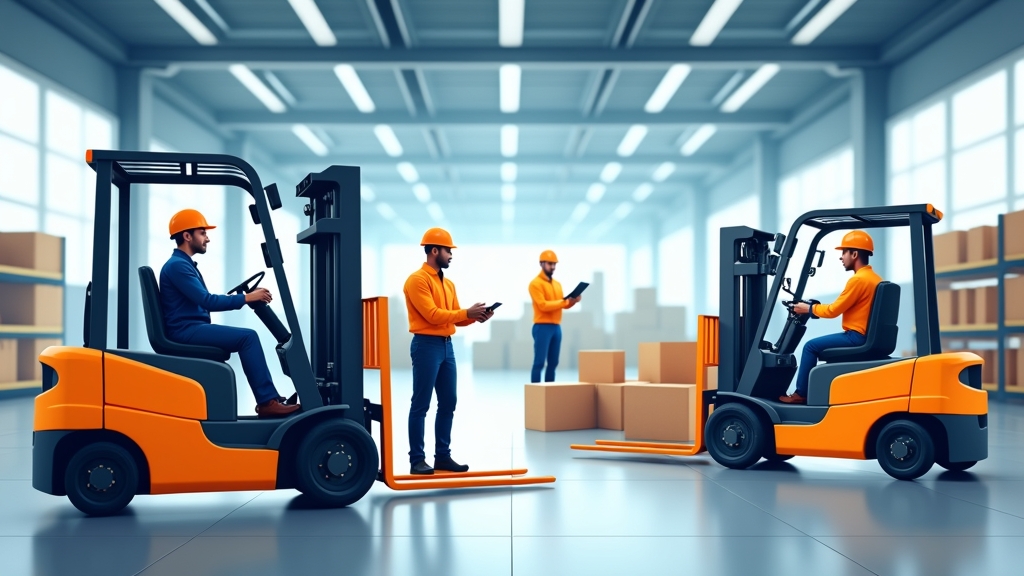advertising
Have you ever felt stagnant professionally, not knowing where to start or how to improve your income? Maybe you're unemployed or looking for a new job, the forklift operator course can help.
This article explores everything you need to know about the forklift operator course, from what you learn to how to choose the best online course for your needs.
What is a Forklift Operator Course?
A forklift operator course is a training program designed to teach the fundamentals of safe and efficient forklift operation. This course covers various types of forklift, including combustion and electric models, as well as specific types such as reach trucks and skid steers. Training is essential not only for worker safety, but also to ensure that load handling operations are carried out efficiently and without damage to products.
The courses usually include theoretical and practical lessons. In the theoretical part, students learn about safety regulations, preventive maintenance and the basics of load balancing. The practical lessons allow students to operate a forklift in a controlled environment, under the supervision of a qualified instructor. In this way, participants gain the confidence and competence to operate forklifts in real work situations.
After completing the course, students usually receive a certificate proving their training, which is a legal requirement in many countries. Certification can be a differentiator in the job market, as it demonstrates that the operator has the necessary knowledge and skills to carry out their duties safely and efficiently.
It's worth noting that, as well as meeting legal obligations, training also helps to reduce accident and maintenance costs, since well-trained operators are less likely to make mistakes that could result in damage to equipment or products.
Course content
Forklift operator courses cover a wide range of topics to ensure that participants acquire a comprehensive and practical knowledge of forklift operation. One of the main areas of focus is safety. Operators learn about the risks associated with using forklifts and the best practices for avoiding accidents. This includes an understanding of regulatory standards, such as NR 11 in Brazil, which establishes the minimum safety requirements for working with load handling.
In addition to safety, the courses explore forklift preventive maintenance. Operators are trained to inspect the equipment before use, identify possible problems and carry out minor repairs or adjustments. This skill is crucial for extending the life of the forklift and ensuring that it operates efficiently.
Another important area is efficient forklift operation. The courses teach load handling techniques, including the correct way to lift, transport and stack materials. Students learn to assess the weight and stability of loads and to move them accurately, minimizing the risk of damage.
Finally, many courses include modules on communication and teamwork. Since forklift operators often work in busy environments such as warehouses and factories, the ability to communicate effectively with coworkers is essential to ensure safe and coordinated operations.
Benefits of Taking a Forklift Operator Course
Taking a forklift operator course offers several benefits for professionals in the field. One of the main ones is improved employability. With increasing automation and mechanization in industries, the demand for qualified operators is on the rise. Having a course completion certificate can be the difference you need to win a job or a promotion.
In addition, formal training ensures that operators understand and apply safety regulations. This not only protects operators and their co-workers, but also reduces companies' liability in the event of accidents. For this reason, many companies prefer to hire certified operators.
Operators who complete the course also tend to be more productive. The practical and theoretical training enables them to carry out their tasks more efficiently, reducing the time needed to handle loads and improving the overall workflow. Operational efficiency is a key factor in the success of any company, and well-trained operators contribute significantly to this.
Finally, completing a course can open doors to continuous professional development. Many operators use certification as a springboard to advance their careers, moving into supervisory positions or specializing in specific types of equipment or operations.
Choosing the Best Online Course
With the growing popularity of distance learning, many people are opting to take a forklift operator course online. However, choosing the right course can be a challenge, given the number of options available. A good starting point is to check that the course is recognized by regulatory bodies, such as the Ministry of Labour in Brazil. This guarantees that the certificate issued at the end of the course will be valid and accepted by companies.
In addition, it is important to evaluate the content of the course. Make sure it covers all the essential topics, such as safety, maintenance and operating techniques. Many online courses offer interactive modules and demonstration videos that facilitate distance learning. So look for those that use multimedia resources to enrich the learning experience.
Another factor to consider is the support offered to students. Good online courses offer access to instructors or tutors who can answer questions and clarify doubts. Read reviews from other students to get an idea of the quality of the support offered.
Finally, consider the cost and flexibility of the course. Very low-priced courses may not offer the level of quality you need, while expensive courses may not be within your budget. Also, check whether the course allows you to study at your own pace, which is a significant advantage for those who need to juggle studies with other responsibilities.
The Importance of Recycling and Updating
Even after completing the initial course, it is crucial that forklift operators take part in regular refresher programs. The logistics sector and the use of forklifts are constantly evolving, with new technologies and practices emerging frequently. Attending refresher courses ensures that operators are aware of the latest innovations and safety standards.

Retraining is also important to reinforce the knowledge you have acquired. Over time, it is natural for some information to be lost or forgotten. Refresher programs revisit key safety concepts and practices, ensuring that operators continue to perform their duties safely and efficiently.
In addition, continuous updating can prepare operators to deal with new types of forklift or associated technologies, such as automation systems and logistics software. This not only broadens the operator's skills, but also increases their employability and career growth potential.
Finally, participation in retraining programs demonstrates a commitment to professionalism and safety, qualities that are highly valued by employers in all sectors.
Final considerations
The forklift operator course is a valuable investment for both individuals and companies. For workers, it offers the opportunity to acquire essential skills and improve employability. For companies, it ensures that their cargo handling operations are carried out safely and efficiently. With the option of online courses, training is more accessible than ever, allowing more people to qualify and advance their careers.
Conclusion
In short, forklift operator training is a crucial step for those wishing to enter or progress in the field of logistics and materials handling. Through comprehensive training, which includes both theoretical and practical aspects, operators develop the confidence and competence needed to perform their duties safely and efficiently. With the possibility of taking the course online, forklift operation education is within everyone's reach, offering flexibility and convenience to suit individual needs.
FAQ
1. What is required to enroll in a forklift operator course?
Generally, you need to be at least 18 years old, have completed basic education and, in some cases, a driving license.
2. How long does a forklift operator course last?
The duration can vary, but most courses are completed in a few days to a week.
3. How much does a forklift operator course cost?
Prices vary depending on the course and location, but online courses can be more affordable.
4. Is there a difference between online and face-to-face courses?
Yes, the main difference is the delivery format, but both must offer complete content and a valid certificate.
5. Can I operate all types of forklifts after the course?
It depends on the course, but many cover the most common types. Check the content before enrolling.
6. Do I need to renew my forklift operator certification?
Yes, it is generally recommended that you renew your certification every two years.
7. Is the online course recognized by the market?
Yes, as long as it is offered by a recognized institution and issues valid certificates.
8. How does the online course cover the practical side?
Many courses offer simulations and videos, but it's ideal to have some face-to-face practice.
9. What safety regulations are covered in the course?
Standards such as NR 11 in Brazil are addressed, focusing on material handling safety.
10. Does the course include forklift maintenance training?
Yes, preventive maintenance is an important part of the course.
11. Do I need previous experience to take the course?
No, the courses are designed for beginners, with no previous experience required.
12. Can I work in any sector with the certification?
Yes, the certification is valid for operating forklift trucks in various industrial and logistics sectors.
13. What are the benefits of taking the online course?
Flexibility, convenience and often lower costs are the main benefits.
14. How can I register for an online course?
Applications can be made directly on the website of the institution offering the course.
15. Do the courses offer student support?
Yes, good online courses offer tutor support to answer questions.



